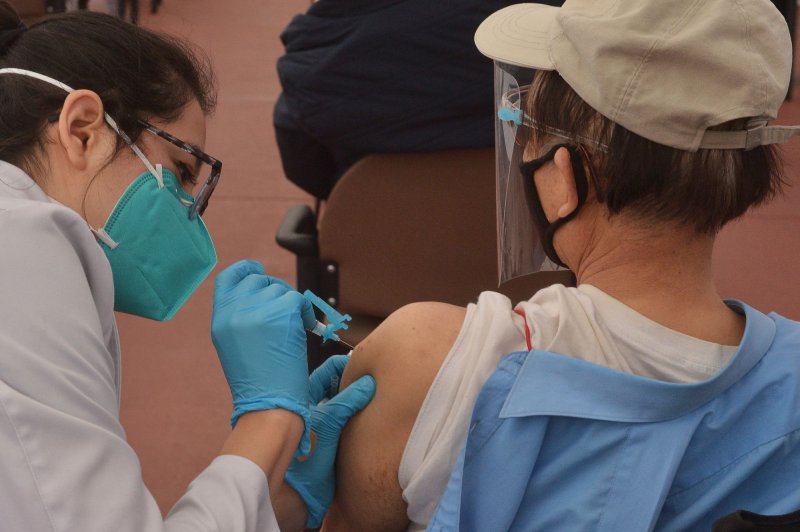ByHealthDay News

A new poll suggests that education level is likely to influence whether someone in the United States is willing to get a coronavirus vaccine. File Photo by Jim Ruymen/UPI | License Photo
In the early weeks of the U.S. vaccine rollout, race looked like it would determine who was willing to get a shot in the arm, but education level now plays the most powerful role in that decision, new research shows.
More than three-quarters of adults with at least a bachelor's degree have been vaccinated or plan to be, compared to 53% of those without a college degree, according to a new survey of more than 6,200 U.S. participants.
"Results of our surveys earlier in the COVID-19 pandemic -- before vaccines were approved -- indicated that race and ethnicity would play a greater role than education level in people's willingness to get the vaccine. But one year into this pandemic, with vaccines now being rolled out across the U.S., education level has become a greater factor than race," said survey director Jill Darling. The data came from the Understanding Coronavirus in America Study.
Earlier in the pandemic, levels of education didn't play as large a role in Americans' attitudes about COVID-19 vaccines, according to the researchers from the University of Southern California's Dornsife Center for Economic and Social Research.
RELATED Experts: Slow vaccine rollout shows U.S. public health 'disinvestment'
Overall, respondents believed there is a 30% chance that someone who has been vaccinated will still get COVID-19 and a 26% chance of serious side effects from a vaccine.
But those rates were 23% and 15%, respectively, among people with a college degree, compared with 34% and 31%, respectively, among those with less education, the findings showed.
Among respondents without a college degree, rates of those who said they're unlikely to get vaccinated are about the same among Black people, at 32%, and White people, at 35%.
RELATED Medical student 'vaccine corps' could help reach underserved areas
But the rate of Black people who said they aren't sure if they'll get vaccinated is much higher, at 23%, than among White people, at 11%.
Interestingly, the survey also found that respondents with college degrees were more likely to know someone who's been vaccinated. The overall rate among respondents was 54%, but it was 69% among those with a bachelor's degree or higher, compared with 46% among those without a college degree.
Among Hispanics, 74% of those with a college education know someone who has been vaccinated, compared to 46% of those with less education. Among Black people, the rates were 55% and 41%, respectively.
RELATED More parents reluctant to give cancer-fighting HPV vaccine to their kids
"Our findings indicate that, in addition to tailoring vaccine awareness campaigns to high-risk groups, policymakers should emphasize the safety and effectiveness of COVID-19 vaccines particularly to those without college degrees," researcher Kyla Thomas, a sociologist with the Dornsife Center, said in a university news release.
"Trust is the big story here: Policymakers need to build trust among less-educated Americans," Thomas added.More information
The U.S. Centers for Disease Control and Prevention has more on COVID-19 vaccines.
Copyright 2020 HealthDay. All rights reserved.
"Our findings indicate that, in addition to tailoring vaccine awareness campaigns to high-risk groups, policymakers should emphasize the safety and effectiveness of COVID-19 vaccines particularly to those without college degrees," researcher Kyla Thomas, a sociologist with the Dornsife Center, said in a university news release.
"Trust is the big story here: Policymakers need to build trust among less-educated Americans," Thomas added.More information
The U.S. Centers for Disease Control and Prevention has more on COVID-19 vaccines.
Copyright 2020 HealthDay. All rights reserved.
No comments:
Post a Comment